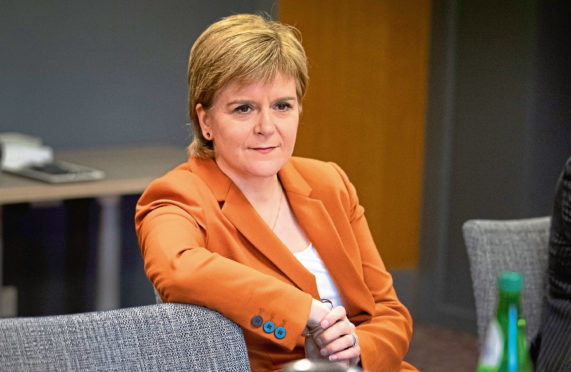Nicola Sturgeon yesterday claimed Theresa May’s Brexit deal will cost every person in Scotland at least £1,600 by 2030 and will sell out the Scottish fishing industry.
The First Minister said no Scottish Government could accept the “damaging” deal as she published Scottish Government analysis suggesting that Brexit would affect trade, spark a decline in Scotland’s working population, a loss of foreign direct investment and have a negative impact on export markets.
At a press conference in Bute House, Edinburgh, Ms Sturgeon launched the document “Scotland’s Place in Europe: An Assessment of the UK Government’s Proposed Future Relationship with The EU”.
Ms Sturgeon’s attack on the Prime Minister’s deal came on the eve of Mrs May’s expected arrival in Scotland today as part of her tour to sell her Brexit deal across the UK.
The document quoted economic modelling that suggested that after Brexit GDP would be £9 billion lower than if Scotland stayed in the EU by 2030 – the equivalent of £1,600 per person.
It added that the backstop being put in place to prevent the return to a hard border in Ireland could leave Scotland at a “serious competitive disadvantage” to Northern Ireland.
“In short, it will make us poorer,” Ms Sturgeon said. “The analysis shows why the deal agreed by the Prime Minister is unacceptable to the Scottish Government and damaging to the people of Scotland.
“No government of Scotland with the interests of this and future generations at heart could possibly accept it.”
On fishing, aquaculture and fish processing, the Scottish Government analysis noted that the industries employed around 14,700 people and contributed £903 million to the Scottish economy.
The document claimed any trade barriers to Scottish seafood exports to the EU would have a “devastating” effect.
Ms Sturgeon said the fishing industry had been sold out despite promises that Brexit would enable fishermen to take back control of UK waters.
By linking access to waters with trade, the document argued that the deal had placed Scotland’s farmed fish and shellfish sectors “at the mercy” of whatever is agreed in future fisheries agreement.
Brexit Secretary Michael Russell, who appeared alongside Ms Sturgeon, at Bute House, said: “We have long feared that Scottish fishing would be expendable in the Brexit negotiations.
“We now see that Scottish aquaculture is being treated as expendable and the UK Government is going to do exactly the only thing that they’ve always done, which is to sell out Scottish fishing interests.”
The document also warned that freedom from tariffs could not be guaranteed when it came to oil exports to the EU.
The potential for increased border friction would have a “severe” impact on perishable food exports such as beef, langoustines and salmon.
It said the whisky industry would not suffer the same tariff issues as other products, but warned that other border checks and excise arrangements would create “unnecessary friction” for a EU exports worth £1.37 billion.
Loss of freedom of movement would see the working age population decline by 1% over the next 25 years rather than the current projection which suggests growth of 1.1%.
Research from the James Hutton Institute had suggested that sparsely populated areas of Scotland could lose more than one quarter of their population by 2046.
Reacting to the document, David Mundell, Secretary of State for Scotland, defended Mrs May’s stance.
He said: “The Prime Minister has secured a deal to protect the future prosperity of all parts of the UK. That’s why the deal has been welcomed by key sectors in the Scottish economy, including farming, fishing and whisky.
“They have made it clear a no-deal Brexit would be a disaster for Scotland and the whole of the UK. The Scottish Government should start listening to them.”
